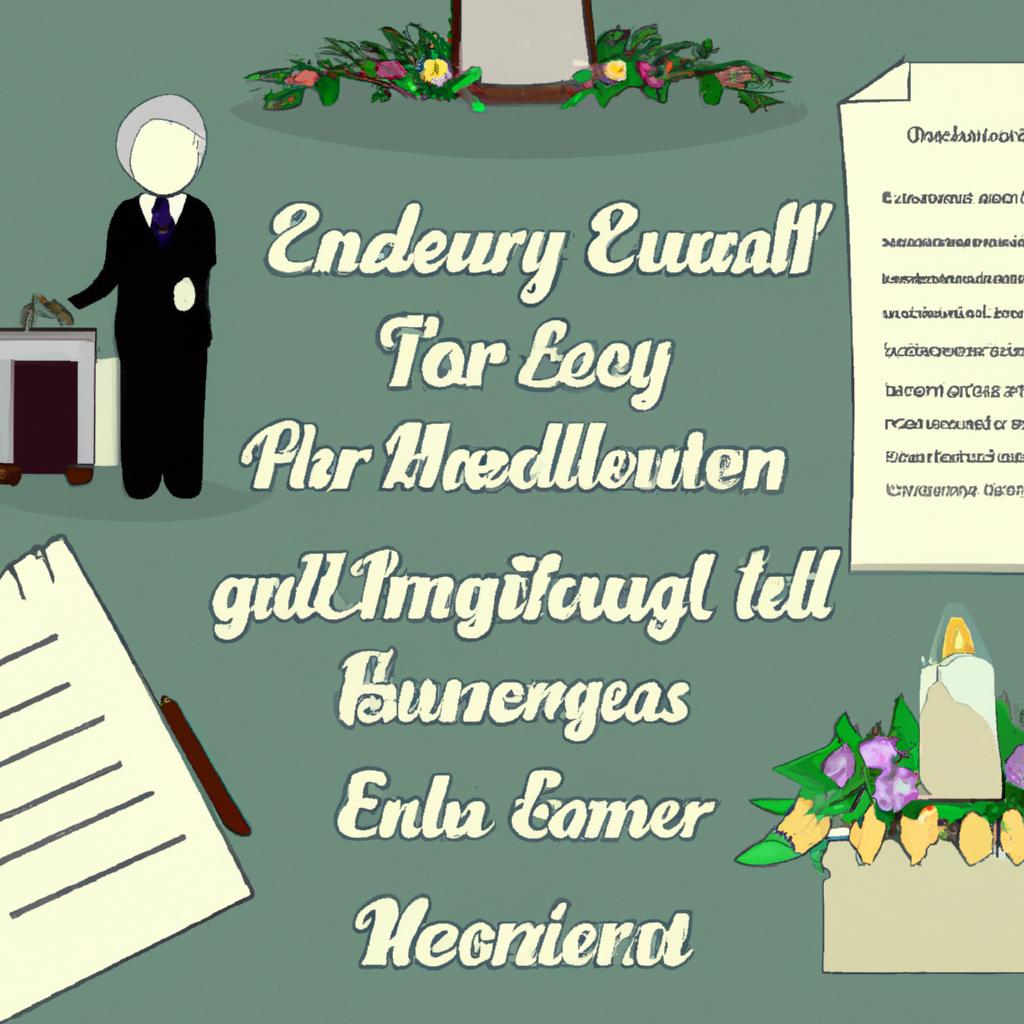The act of speaking at a funeral is a solemn duty that requires careful consideration and tact. As experienced practitioners in the realm of estate planning and probate, the team at Morgan Legal Group understands the weight of words spoken in a time of grief. In this article, we will delve into the nuances of delivering a eulogy, offering guidance on how to honor the memory of a loved one with grace and poise. Whether you are tasked with delivering a heartfelt tribute or simply offering a few comforting words, our expertise in matters of Wills and trusts can help you navigate this challenging terrain with confidence and compassion.
Key Considerations when Speaking at a Funeral
When delivering a eulogy or speaking at a funeral, it is important to remember the following key considerations:
- Keep your remarks concise and focused on the deceased
- Share personal anecdotes and stories that highlight the deceased’s character and legacy
- Consider the feelings of the grieving family and friends in attendance
- Acknowledge the emotions of the audience and offer words of comfort
- Avoid controversial topics or anything that could cause unnecessary distress
Remember that speaking at a funeral is an honor and a privilege. Take the time to carefully prepare your remarks and speak from the heart. Your words have the power to provide comfort and solace to those who are mourning the loss of a loved one.
Navigating Emotions and Finding the Right Words
When speaking at a funeral, it is essential to navigate your emotions carefully and find the right words to express your thoughts and feelings. This can be a challenging task, as grief can often cloud our judgment and make it difficult to articulate our thoughts effectively. However, by taking the time to reflect on your relationship with the deceased and choosing your words thoughtfully, you can offer a meaningful and heartfelt tribute.
When preparing to speak at a funeral, consider the following tips to help you navigate your emotions and find the right words:
- Reflect on your relationship: Take some time to think about your memories with the deceased and how they impacted your life. This can help you to choose words that are genuine and heartfelt.
- Practice your speech: Rehearsing your speech beforehand can help you to feel more confident and composed on the day of the funeral. It can also help you to refine your words and ensure that they convey the message you intend.

Honoring the Deceased with Personalized and Respectful Remarks
When delivering remarks at a funeral, it is crucial to approach the task with the utmost sensitivity and respect. One way to honor the deceased is by personalizing your remarks to reflect their unique personality, qualities, and contributions to those around them. By sharing anecdotes, memories, and kind words, you can help celebrate the life of the departed in a meaningful and heartfelt way.
It is important to remember that your words hold power and can provide comfort to grieving loved ones. Be sure to speak with empathy and compassion, offering words of support and encouragement during this difficult time. Additionally, consider incorporating religious or cultural traditions that hold significance for the deceased and their family, creating a ceremony that is both personalized and respectful.

Guidelines for Delivering a Memorable Eulogy
When delivering a eulogy at a funeral, it is essential to honor the memory of the departed with grace and dignity. Follow these guidelines to ensure that your words leave a lasting impact on the audience:
- Personalize the eulogy: Share anecdotes and memories that showcase the essence of the deceased. By including personal stories, you create a connection with the audience and paint a vivid picture of the individual’s life.
- Stay respectful and tactful: While it is important to be honest and authentic in your eulogy, be mindful of the sensitivities of the grieving family and friends. Choose your words carefully and avoid anything that may cause additional pain or discomfort.
| Name | Relation |
|---|---|
| John Doe | Brother |
| Jane Smith | Close Friend |
By following these guidelines, you can deliver a eulogy that not only honors the memory of the departed but also provides comfort and closure to those in mourning.
Q&A
Q: Why is it important to speak at a funeral?
A: Speaking at a funeral allows individuals to pay tribute to and honor the memory of the deceased, while also providing comfort and closure to those in attendance.
Q: What should I consider before speaking at a funeral?
A: Before speaking at a funeral, it’s important to consider your relationship with the deceased, the message you want to convey, and the emotional state of the audience.
Q: How can I effectively express my thoughts and emotions while speaking at a funeral?
A: To effectively express your thoughts and emotions at a funeral, speak from the heart, be sincere, and use personal anecdotes or memories to convey your message.
Q: Is it okay to show emotions while speaking at a funeral?
A: Yes, it is perfectly okay to show emotions while speaking at a funeral. In fact, showing vulnerability and raw emotions can be a powerful way to connect with others and convey your feelings.
Q: What can I do if I feel too overwhelmed to speak at a funeral?
A: If you feel too overwhelmed to speak at a funeral, consider writing a letter or poem that can be read by someone else on your behalf. Alternatively, you can also participate in a group tribute or moment of silence to honor the deceased.
In Retrospect
In conclusion, speaking at a funeral is a challenging but important way to honor and remember our loved ones. It allows us to share our thoughts, memories, and emotions in a way that can bring comfort and closure to those who are grieving. Whether you are asked to speak or choose to do so voluntarily, remember that your words have the power to heal, uplift, and celebrate the life of the person who has passed. Embrace the opportunity to speak from the heart and pay tribute to the impact they had on your life and the lives of others. In the end, speaking at a funeral is a gift we give not only to the departed, but also to ourselves as we navigate the journey of grief and remembrance.
 Speaking at a funeral can be a daunting task for many people. It can be emotionally overwhelming to say goodbye to a loved one and having to speak in front of a grieving audience can add to the pressure. However, speaking at a funeral is also a way to honor and pay tribute to the life of the person who has passed away. It is an opportunity to share memories, offer comfort, and provide closure for family and friends. In this article, we will discuss the importance of speaking at a funeral, tips for delivering a meaningful eulogy, and the benefits of speaking at a funeral.
Speaking at a funeral can be a daunting task for many people. It can be emotionally overwhelming to say goodbye to a loved one and having to speak in front of a grieving audience can add to the pressure. However, speaking at a funeral is also a way to honor and pay tribute to the life of the person who has passed away. It is an opportunity to share memories, offer comfort, and provide closure for family and friends. In this article, we will discuss the importance of speaking at a funeral, tips for delivering a meaningful eulogy, and the benefits of speaking at a funeral.
Why is Speaking at a Funeral Important?
Funerals are an essential part of the grieving process, and they provide an opportunity for family and friends to come together to honor and remember the life of the deceased. Speaking at a funeral can help in the healing process and offer closure for loved ones. It also gives the person an opportunity to express their feelings and share memories of the deceased.
A funeral is also a way to celebrate the life of the person who has passed away. It is a time to reflect on their achievements, their impact on others, and the memories they have left behind. Speaking at a funeral allows family and friends to pay tribute to the person and share stories and memories that may bring comfort and catharsis to the grieving audience.
Tips for Delivering a Meaningful Eulogy
1. Prepare in Advance: It is important to take the time to prepare and organize your thoughts before delivering a eulogy. Begin by gathering memories and stories from friends and family members to incorporate into your speech. Write down the key points you want to convey and practice speaking out loud beforehand to help build confidence.
2. Keep It Personal: A eulogy is a personal tribute, so it is important to incorporate your own memories and experiences with the deceased. Share stories that highlight their unique qualities, accomplishments, and the impact they had on your life.
3. Be Concise: A eulogy should not be lengthy and take up too much time. Keep it concise and to the point, focusing on the most important memories and qualities of the person.
4. Speak from the Heart: It can be challenging to remain composed while speaking at a funeral, but it is important to speak from the heart. Share your genuine feelings and emotions and allow yourself to be vulnerable. This will make your eulogy more authentic and impactful.
5. Practice Good Delivery: When delivering a eulogy, speak slowly and clearly, and make eye contact with the audience. Take deep breaths and try to remain calm. If you feel overwhelmed, take a moment to pause and collect your thoughts.
Benefits of Speaking at a Funeral
1. Honoring the Deceased: Speaking at a funeral is a way to honor the life of the person who has passed away. It is a chance to pay tribute to their impact and to celebrate their unique qualities and accomplishments.
2. Offering Comfort and Closure: Speaking at a funeral can bring comfort and closure to both the speaker and the audience. Hearing stories and memories can provide comfort to those grieving and offer a sense of closure in saying goodbye to their loved one.
3. Healing and Catharsis: The act of speaking at a funeral can be a healing and cathartic experience. It allows the speaker to express their feelings and emotions and provides an outlet for grief. It can also bring healing to the audience as they hear stories and memories of their loved one.
4. Strengthening Connections: Speaking at a funeral can help strengthen connections between family and friends. It provides an opportunity for people to come together and share their memories and emotions, bringing them closer together during a difficult time.
Real-Life Case Study
Sarah recently lost her mother to a long battle with cancer. She was asked by her family to speak at the funeral and was initially hesitant because of her grief and fear of public speaking. However, she ultimately decided to accept the offer and deliver a eulogy in honor of her mother.
Through the process of writing and delivering the eulogy, Sarah was able to reflect on her mother’s life, remember precious memories, and connect with her family and friends on a deeper level. Her eulogy brought both tears and laughter, and it provided comfort for those grieving. Sarah found that speaking at the funeral allowed her to honor her mother’s life and express her love and gratitude for her in a way that was meaningful and healing.
Final Thoughts
Speaking at a funeral is a significant opportunity to pay tribute to the life of the person who has passed away. It allows for sharing memories and stories that can bring comfort and healing to those grieving. By following the tips outlined in this article and understanding the importance and benefits of speaking at a funeral, you can deliver a meaningful and impactful eulogy that honors your loved one’s memory.











